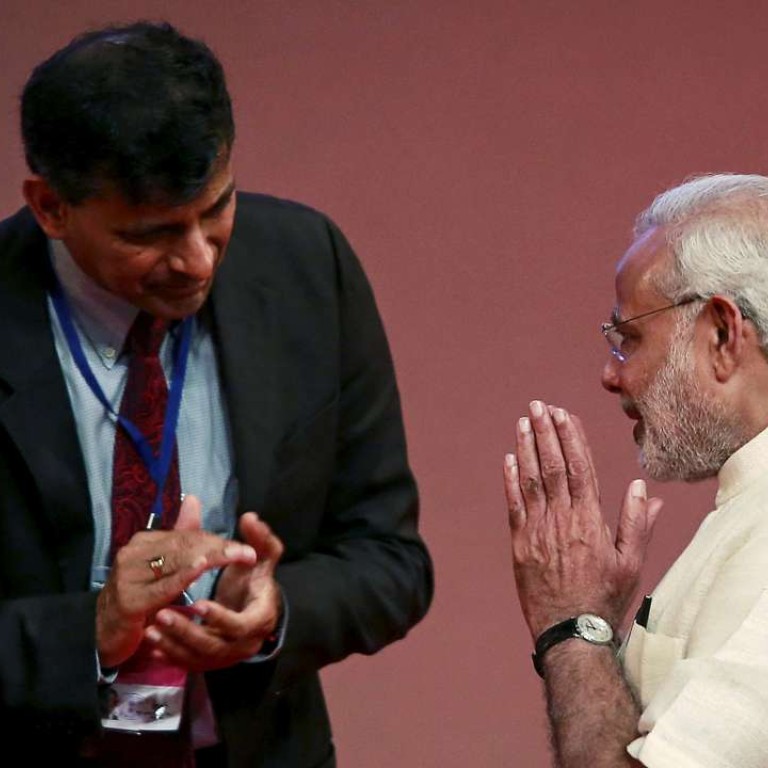
Rajan’s departure from the RBI is bad news for India
‘Rock star’ central banker made a huge difference to quality and credibility of Indian policymaking since taking the reins in September 2013
This week, global financial markets have been fixated on the risk of a British exit from the European Union (EU), or “Brexit”, in a high-stakes referendum, the results of which will be known Friday.
India, however, has already suffered its own version of a damaging event that could severely undermine investor confidence.
Financial analysts are dubbing the unexpected decision last weekend by India’s well-respected central bank governor, Raghuram Rajan, not to seek reappointment when his current term expires in early September a “Rexit”.
In a letter to the staff of the Reserve Bank of India (RBI) published on June 18, Rajan – a former chief economist of the International Monetary Fund (IMF) and a “rock star” central banker whose candid views about the state of India’s economy and fiercely independent style have riled many members of premier Narendra Modi’s Hindu nationalist government – said that while he was “open” to serving a second term, “on due reflection, and after consultation with the government, I want to share with you that I will be returning to academia”.
Make no mistake; Rajan was forced out because of staunch criticism of his policies and his views on the governance of India.
His departure from the RBI is one of the most significant and troubling developments in a major emerging market (EM) over the past several years. That it is India – a developing economy which has been viewed by investors as one of the most resilient EMs, whose policy regime is now a focal point of concern – is all the more remarkable.

In a note, Nomura said “this is a negative surprise as markets (and we) were expecting him to continue. Rajan added credibility to the RBI and there is no obvious successor of a similar stature”. Meanwhile Kotak, an Indian brokerage, said it is “baffled by the development”, adding that “many investors believed they could leave the India portion of their portfolios on auto pilot. They will now have to navigate through the implications of [a Rexit]”.
Rajan has made a huge difference to the quality and credibility of Indian policymaking since he took the reins of the RBI in September 2013.
Not only did he help stem a currency crisis in the months leading up to his appointment by swiftly establishing his inflation-fighting credentials – Rajan hiked rates three times in his first five months as governor and introduced a range of measures to improve the transparency of Indian monetary policy – he also put pressure on India’s public sector banks to get tough with their heavily indebted borrowers with a view to reducing the worryingly high level of non-performing loans (NPLs) in the sector.
At a time when investor confidence in the policy regimes of many other leading EMs (in particular China but also Turkey, South Africa and Brazil) has been severely undermined, Rajan restored faith in India’s economy.
That Modi’s government was unwilling to come to his defence after he came under fierce criticism from hardliners in the ruling Bharatiya Janata Party (BJP) – Subramanian Swamy, an influential member of the BJP, even accused Rajan of “wilfully wrecking” India’s economy and being “mentally not fully Indian – calls into question India’s commitment to economic reform and its ability to withstand a sharp deterioration in sentiment towards EMs.
The investment case for India, which was already looking weaker because of the government’s failure to push key reforms...has just taken a severe knock
The investment case for India, which was already looking weaker because of the government’s failure to push key reforms, notably the introduction of a nationwide goods and services tax (GST), through parliament, has just taken a severe knock.
In his letter of resignation, Rajan even singled out two important areas where there has been insufficient progress in reforms. “The bank clean-up initiated under the Asset Quality Review, [while] having brought more credibility to bank balance sheets, is still ongoing,” Rajan noted.
Indeed there is speculation that the real reason why Modi’s government was reluctant to extend Rajan’s term was because of pressure from the indebted yet influential industrial companies that stood to lose from Rajan’s efforts to clean up India’s banking system. In February, Rajan warned that a period of “deep surgery” in the sector was needed in order to reduce the share of bad loans that have been crimping private investment.
While Rajan has urged investors not to over-personalise Indian monetary policy and instead focus on the much-improved institutional framework he put in place, Eswar Prasad, a renowned expert on India, is right to warn that “not having a strong central bank governor who understands banking and can stand up to political pressures could stymie progress”.
Rajan’s successor could face a baptism of fire.
This column was amended to reflect that the results of the British referendum on EU membership will be known on Friday.
Nicholas Spiro is a partner with Lauressa Advisory

